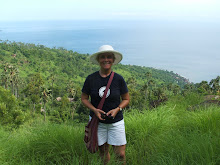Look Ma the splits!
Okay, so these Orangatans were in a rehabilitation centre and not in the wild, but it didn't take away from the incredible feelings of wonder as we watched them play, eat and climb through the trees. If it wasn't for the Sepilok Rehab Centre, these orangatans would not be alive, for they have been rescued from local palm oil plantations where farmers see them as pests. Most people are now aware of palm oil and its connection to the demise of orangutans. The reality of this hit us as we flew across the width of Borneo to Sandakan on the East coast. We were stunned by the extent of palm oil plantations, appearing lush and green from the air. Neat rows of palm trees have replaced the natural rainforest and the habitat of the orangutan. Only 3% of the natural forest remains in Borneo. So, what will become of the "Man of the forest?" Fortunately, there are enough concerned and dedicated people helping to save these beautiful animals who have 96% in common with our DNA.
On our second day in Borneo, we headed up the Kinabatangan River in a boat to an eco lodge. Along the river bank, we were fortunate to spot a male orangutan in the trees busily eating some large pine nuts. Orangutans are solitary creatures and very shy, so we weren't surprised when he suddenly climbed down from the tree top, walked deeper into the jungle and climbed another tree, camouflaging himself from us.

We were lucky to share some space with this beautiful male orangutan.





No comments:
Post a Comment